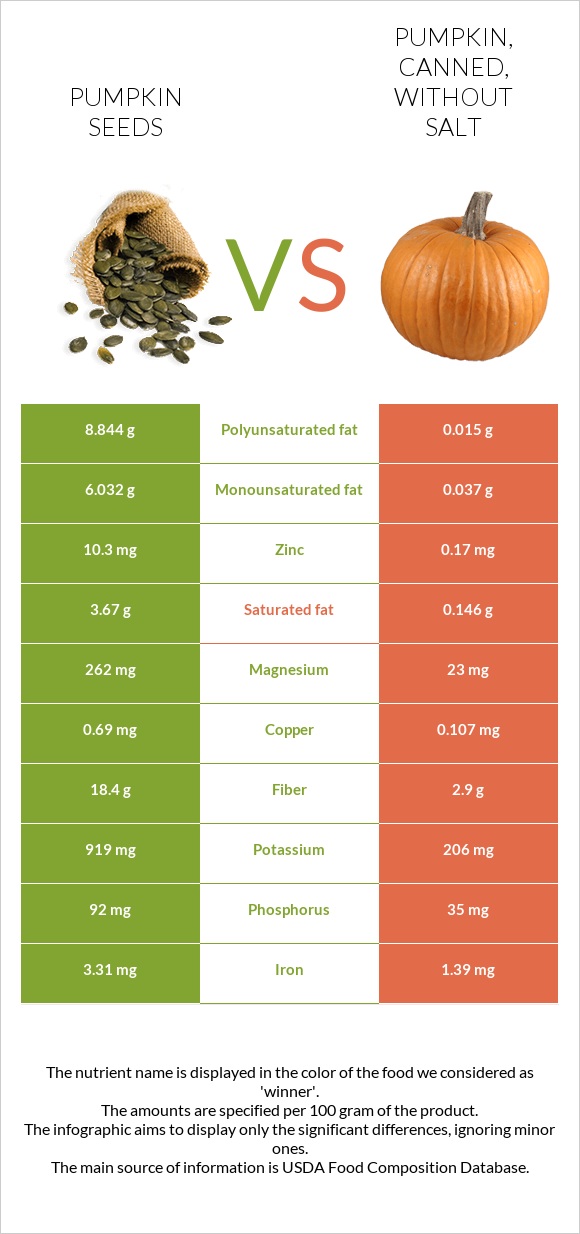Pumpkin seeds vs. Pumpkin, canned, without salt — In-Depth Nutrition Comparison
Compare
What are the differences between pumpkin seeds and pumpkin, canned, without salt?
- Pumpkin seeds are higher in zinc, copper, fiber, magnesium, iron, potassium, manganese, and phosphorus, yet pumpkin, canned, without salt is higher in vitamin A.
- Pumpkin, canned, without salt's daily need coverage for vitamin A is 310% more.
- Pumpkin seeds have 61 times more zinc than pumpkin, canned, without salt. While pumpkin seeds have 10.3mg of zinc, pumpkin, canned, without salt has only 0.17mg.
- The amount of saturated fat in pumpkin, canned, without salt is lower.
We used Seeds, pumpkin, and squash seeds, whole, roasted, without salt and Pumpkin, canned, without salt types in this article.
Infographic

Infographic link
Mineral Comparison
Mineral comparison score is based on the number of minerals by which one or the other food is richer. The "coverage" charts below show how much of the daily needs can be covered by 300 grams of the food.
| Contains more MagnesiumMagnesium | +1039.1% |
| Contains more CalciumCalcium | +111.5% |
| Contains more PotassiumPotassium | +346.1% |
| Contains more IronIron | +138.1% |
| Contains more CopperCopper | +544.9% |
| Contains more ZincZinc | +5958.8% |
| Contains more PhosphorusPhosphorus | +162.9% |
| Contains more ManganeseManganese | +232.9% |
| Contains less SodiumSodium | -72.2% |
Vitamin Comparison
Vitamin comparison score is based on the number of vitamins by which one or the other food is richer. The "coverage" charts below show how much of the daily needs can be covered by 300 grams of the food.
| Contains more Vitamin B1Vitamin B1 | +41.7% |
| Contains more Vitamin CVitamin C | +1300% |
| Contains more Vitamin AVitamin A | +25833.3% |
| Contains more Vitamin B3Vitamin B3 | +28.3% |
| Contains more Vitamin B5Vitamin B5 | +614.3% |
| Contains more Vitamin B6Vitamin B6 | +51.4% |
| Contains more FolateFolate | +33.3% |
All nutrients comparison - raw data values
| Nutrient |  |
 |
DV% diff. |
| Zinc | 10.3mg | 0.17mg | 92% |
| Vitamin A | 3µg | 778µg | 86% |
| Copper | 0.69mg | 0.107mg | 65% |
| Fiber | 18.4g | 2.9g | 62% |
| Polyunsaturated fat | 8.844g | 0.015g | 59% |
| Magnesium | 262mg | 23mg | 57% |
| Protein | 18.55g | 1.1g | 35% |
| Fats | 19.4g | 0.28g | 29% |
| Iron | 3.31mg | 1.39mg | 24% |
| Calories | 446kcal | 34kcal | 21% |
| Potassium | 919mg | 206mg | 21% |
| Saturated fat | 3.67g | 0.146g | 16% |
| Monounsaturated fat | 6.032g | 0.037g | 15% |
| Carbs | 53.75g | 8.09g | 15% |
| Manganese | 0.496mg | 0.149mg | 15% |
| Vitamin K | 16µg | 13% | |
| Phosphorus | 92mg | 35mg | 8% |
| Vitamin B5 | 0.056mg | 0.4mg | 7% |
| Vitamin E | 1.06mg | 7% | |
| Vitamin C | 0.3mg | 4.2mg | 4% |
| Calcium | 55mg | 26mg | 3% |
| Choline | 9.8mg | 2% | |
| Folate | 9µg | 12µg | 1% |
| Vitamin B1 | 0.034mg | 0.024mg | 1% |
| Vitamin B6 | 0.037mg | 0.056mg | 1% |
| Vitamin B3 | 0.286mg | 0.367mg | 1% |
| Selenium | 0.4µg | 1% | |
| Sodium | 18mg | 5mg | 1% |
| Net carbs | 35.35g | 5.19g | N/A |
| Sugar | 3.3g | N/A | |
| Vitamin B2 | 0.052mg | 0.054mg | 0% |
| Tryptophan | 0.326mg | 0.013mg | 0% |
| Threonine | 0.683mg | 0.032mg | 0% |
| Isoleucine | 0.956mg | 0.034mg | 0% |
| Leucine | 1.572mg | 0.051mg | 0% |
| Lysine | 1.386mg | 0.06mg | 0% |
| Methionine | 0.417mg | 0.012mg | 0% |
| Phenylalanine | 0.924mg | 0.035mg | 0% |
| Valine | 1.491mg | 0.038mg | 0% |
| Histidine | 0.515mg | 0.017mg | 0% |
Macronutrient Comparison
Macronutrient breakdown side-by-side comparison
Protein:
18.55 g
Fats:
19.4 g
Carbs:
53.75 g
Water:
4.5 g
Other:
3.8 g
Protein:
1.1 g
Fats:
0.28 g
Carbs:
8.09 g
Water:
89.97 g
Other:
0.56 g
| Contains more ProteinProtein | +1586.4% |
| Contains more FatsFats | +6828.6% |
| Contains more CarbsCarbs | +564.4% |
| Contains more OtherOther | +578.6% |
| Contains more WaterWater | +1899.3% |
Fat Type Comparison
Fat type breakdown side-by-side comparison
Saturated fat:
Sat. Fat
3.67 g
Monounsaturated fat:
Mono. Fat
6.032 g
Polyunsaturated fat:
Poly. Fat
8.844 g
Saturated fat:
Sat. Fat
0.146 g
Monounsaturated fat:
Mono. Fat
0.037 g
Polyunsaturated fat:
Poly. Fat
0.015 g
| Contains more Mono. FatMonounsaturated fat | +16202.7% |
| Contains more Poly. FatPolyunsaturated fat | +58860% |
| Contains less Sat. FatSaturated fat | -96% |